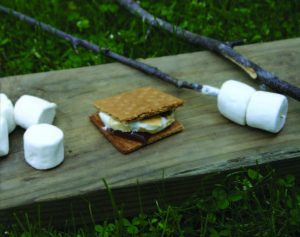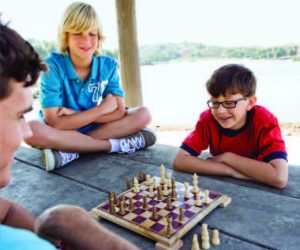Picking the perfect summer camp has never been easier…which is why you need to start NOW.
By Christine Gibbs

Photo credit: iStockphoto/Thinkstock
How nice it is, in a world that moves at fiber-optic speed, that some things never change. Summer sleepaway camp has been a rite of passage for countless young Americans, stretching back generations in some families. In fact, 2012 marked the 150th anniversary of worldwide camping.
There’s just one thing. Replicating the summer camp experience we enjoyed for our own children (or in some cases grandchildren) isn’t the no-brainer it used to be, especially if you want to build a young person’s mind and body. In this age of specialization, we must assume the exhausting responsibility of matching our children’s interests, likes and dislikes—and perhaps their budding talents—to the camp that offers the greatest chance to learn, to grow and to thrive. All for the pleasure of writing out a large check and then fighting back the tears as they roll away for two to ten weeks of parentally unsupervised fun.
Pick the wrong camp, and not only won’t you ever hear the end of it, your kid will probably find some clever way to work it into your eulogy. Pick the right camp, and at the end of the session your child may grant you a grunt of approval when you ask how it was.
The pressure to get into that “right” camp may not be quite as intense as getting into the right college, but given the ever-expanding choices on top of variables on top of more choices, the process may be even more daunting. That is especially true for a small group of elite camps, such as the by-invitation-only program at Johns Hopkins University’s Center for Talented Youth, which is rigorously selective based on standardized test scores. Really? Yes, really.
Camping in the 21st Century
For those families with mere mortal offspring, the first order of business is deciding between the two types of summer sleepaway camps. There are the old-school Hello, Muddah, Hello, Faddah operations, which feature time-honored and universally shared activities (from hiking and canoeing to complaining about the grub and torturing the counselors). And then there are the specialty camps, which cater to almost every conceivable skill and interest. Is your daughter interested in robotics? Is your son’s golf swing in need of a tune-up? There are several camps within a couple of hours drive that can handle that. Are you arguing with your child about which camp is the right camp? You might consider a debate camp. Really? Again, yes, really.

Photo credit: iStockphoto/Thinkstock
In days past, dating all the way back to the early 1900s, the vast majority of summer sleepaway camps were of the traditional variety: scouting-, religious- or sports-oriented. Today there is a camp for practically every special interest, not to mention many that target special needs ranging from weight loss to autism to terminal illnesses. There are language and travel camps, both domestic and international. There are camps for all of the arts—fine art, music, writing and performing. There are science, environmental and technical camps galore. Stevens Institute in Hoboken offers its ECOES program (Exploring Career Options in Engineering and Science) and even Apple opens some of its stores to offer free fun summer programs focusing on its own brand of electronic devices.
Sports camps have become an industry unto themselves. They specialize in activities such as golf, soccer, tennis, field hockey, competitive swimming, scuba, sailing and even rock climbing. There are numerous camps whose primary focus is to fast-track budding athletes (some as young as 8 or 9) toward some future Olympics. Others aim at building the skills necessary to secure a college scholarship in sports ranging from softball to sculling. There are football camps for quarterbacks only…which begs the question, who are they throwing and handing-off to? These camps offer fun and games with a serious side; they separate the wheat from the chaff by offering an atmosphere of competition, achievement and success.
Serious, success-driven camps are hardly limited to sports. Future Stars Camp in Warminster, PA, the Superkidz Kamp in Montclair, NJ and Stagedoor Manor—a 26-year old theatrical training camp in the Catskills which counts Natalie Portman, Mandy Moore and Robert Downey, Jr. among its alumnae—are hardcore performing arts boot camps.
And yes, there are actual boot camps now. Often geared toward working with troubled teenagers, they push kids to learn teamwork and also self-reliance in a quasi-military/wilderness environment. They tend to temper their intense work schedules with more traditional recreational camp-type activities such as swimming, hiking and just plain horsing around.
Fortunately, there are plenty of summer camps at the other end of the seriousness spectrum. The Quaker-run Dark Waters Camp in Medford, NJ encourages a non-competitive philosophy with a wide array of arts, crafts and outdoor activities. Similarly, a more balanced agenda is offered at the Stokes Forest Music Camp, where the John J. Cali School of Music at Montclair State University counterbalances serious music sessions with environmental studies and recreational activities. Statistics compiled by the American Camp Association (acacamps.org), indicate that 57% of their accredited camp membership focuses on team-building and more than half provide opportunities for community service, such as area cleanups, recycling, and volunteerism at nursing homes and hospitals.
Dollars and Sense
According to industry statistics compiled by the National Camp Association, U.S. camps rake in an annual $11 billion in business. More than 11 million American children last summer were tearfully bused or otherwise delivered by their parents to the 12,000 camps spread throughout the nation. Of these, about 60% are of the sleepover variety, two-thirds are run by non-profit organizations, and the remaining third are privately owned for-profit businesses. About one in five camps receive American Camp Association accreditation, which means they have met 300 health and safety standards.

Photo credit: iStockphoto/Thinkstock
This is worth thinking about when narrowing down your choices. Parents are often surprised to learn that, unlike pre-school, there is no government agency that monitors camp conditions and standards. And although most camps are small businesses, they employ more than 1.2 million adults in various capacities such as camp counselors, activity leaders, program directors and support services personnel, so it is something more than a cottage industry.
Not surprisingly, recent economic conditions have impacted consumer spending on summer camps. The good news is that the vast majority have been able to maintain their high standards, with some actually stepping up their games and becoming more competitive. The general consensus about the tangible and intangible benefits of the sleepaway camp experience has kept the industry going. This combination of forces has also benefitted day camps, which are less expensive and often more specialized than sleepaway camps.
Sleepover fees can vary from about $200 to upwards of$800 per week per child. Many camps offer financial assistance of one kind or another—including scholarships (aka “camperships”)—so if you need it, don’t be shy about asking what programs are available.
At the higher end of the scale are camps such as Camp Robindel for girls, located in Moultonboro, NH. At just under $11,000 for the summer, it offers yoga, horseback riding, paddle boarding, surfing, and knee boarding as well as bi-weekly themed meals that are a far cry from the unappetizing camp fare of yesteryear. For boys, a fee of$10,750 for Camp Skylemar in Naples, ME covers a five-hole golf course, eight tennis courts, and three indoor-and-outdoor basketball courts—plus all that nature has to offer. Yet even at the lower end of the scale, there are plenty of specialty sleepaway camps that will match your child’s passions and interests. Their offerings range from computers and technology to fashion and fitness, to the culinary or performing arts.
As much as we want our children to go to the best possible camp, we also want to negotiate lower fees and expenses. There are nearly $40 million in scholarships out there, but beyond these programs, you can explore other ways ways to make fees fit a leaner pocketbook, including no-interest installment payments, sibling deals, early bird sign-up discounts and playing two competing camps off each other. You’ll find some other ideas at campparents.org and camppage.com. Something that many parents are unaware of is the credit the IRS gives for summer camp costs. The Child and Dependent Care Tax Credit can cover 20% to 35% of childcare up to$3,000 for each child. In most cases, the IRS considers summer camp as an allowable form of childcare expense if it is necessary for parents to be able to continue to work through the summer.

Photo credit: iStockphoto/Thinkstock
Keeping the Campfires Burning
The folks who own and operate summer camps are seasoned professionals who take on the myriad responsibilities associated with providing the most rewarding, enjoyable and safe overall summer experience for all resident campers. Their business depends on positive word-of-mouth from parents and, of course, happy campers. With the growth of social media and web sites over the last generation, the quality-control bar has been raised to new heights. One bad review, easily Googled, can put a dent in even the best camp’s bottom line.
Sheryl Kirschenbaum, Director of Surprise Lake camp in Cold Spring, NY is a good example of hands-on camp administration. When asked about the focus of this Jewish-faith summer camp (which dates back to 1902), she thoughtfully sums it all up. “It’s about intangibles,” she explains. “We let kids be kids. We provide a safe place away from some of the daily insanity that surrounds them. Our focus is always on warm and welcoming…but no cell phones allowed!”
Can Kirschenbaum describe the perfect camper for Surprise Lake? “There is none. Camp is magical in different ways for different children. They’re all perfect in some ways or other.”
“However,” she adds, “I am always searching for the perfect counselor!”
A striking example of a successful family-run camp is Camp Jeanne d’Arc, nestled in the rolling hills of Merrick, NY. The Director, Jehanne McIntyre Edwards is the granddaughter of feminist Ruth Israel McIntyre, who began working with the Girl Scouts in her Philadelphia parish early in the 20th century and moved on to work with the Girl Guides in France during WWI. That French connection was the inspiration behind naming the camp and fulfilling her vision for young women everywhere. Edwards is a believer in the advantages of a girls-only traditional camp. “Girls tend to more easily integrate into a close community environment,” she maintains. “The older campers often become ‘big sisters’ to the younger ones, which can be very helpful in overcoming some inevitable homesickness.”
A totally flexible summer schedule offers 2- (for the younger “newbies”) to 7-week sessions for a fortunate 130 young girls from 8-16. The main focus, according to Edwards, is to foster intercultural growth through a diverse body of campers. The goal is to encourage individual skills and strengths over time to build confidence and self-worth. “We believe that small goals will lead to great success,” she says. Although the camp encourages some friendly competition, it definitely is not one of the high-intensity special-interest camps.
Vetting a Camp
The quality of a summer camp can be measured in many ways, however the one that speaks most clearly may be the percentage of campers in the oldest group who started in the youngest. A healthy population of “lifers” is a good sign. At the best of the best, those graduated campers continue to come back, as junior counselors and then as full-fledged counselors. When evaluating your choices, this is something that definitely needs to be on your checklist of questions.
What else should be on that list? Ask about the safety and security measures that are in place, and what medical resources are available in case of emergency. Ask about the food—what is the typical daily/weekly menu? Is there a nutritionist on staff, or are there at least some basic nutritional guidelines being followed? What kind of training and experience are required of the counselors and directors—are they subjected to background checks?
What is the ratio of campers to counselors? There is no “right” number, but it is a useful statistic for comparison purposes. It is also prudent to ask a camp to elaborate on its discipline policies. If you have an unruly child or if you are afraid you child might be picked on, find out how a camp handles these situations.
References are crucial. Even if you have been pointed to a particular camp by a trusted friend or neighbor, ask if you can communicate with other parents. Finally, trust your instincts and your own eyes. If the camp is within a couple of hours, you might even consider visiting while it is in session.
Always remember that you as parents are in the driver’s seat when it comes to final decision-making. You are undertaking a significant investment in your child’s overall summer experience, so don’t be shy about asking some tough questions.

Photo credit: iStockphoto/Thinkstock
WHY CAMP?
In times past, there were some parents who looked upon camp as a “dumping ground” that freed up their own summers for adult recreation. Today, parents are more involved in a rigorous camp selection process. According to the American Camp Association, the three most frequently cited reasons why parents send their children to camp are to:
- build self-confidence and self-esteem;
- provide a safe environment;
- build social skills and make friends.





